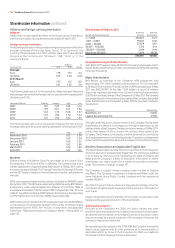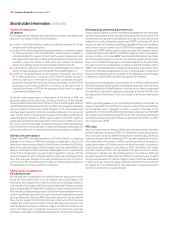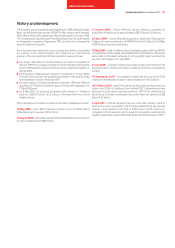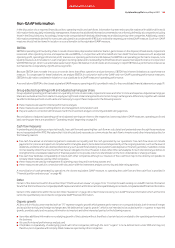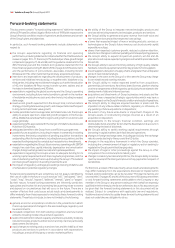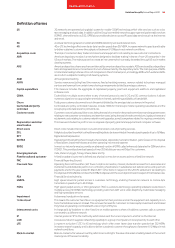Vodafone 2011 Annual Report Download - page 142
Download and view the complete annual report
Please find page 142 of the 2011 Vodafone annual report below. You can navigate through the pages in the report by either clicking on the pages listed below, or by using the keyword search tool below to find specific information within the annual report.140 Vodafone Group Plc Annual Report 2011
Our operating companies are generally subject to regulation governing
the operation of their business activities. Such regulation typically takes the
form of industry specific law and regulation covering telecommunications
services and general competition (antitrust) law applicable to all activities.
The following section describes the regulatory frameworks and the key
regulatory developments at the global and regional level and in selected
countries in which we have significant interests. Many of the regulatory
developments reported in the following section involve ongoing
proceedings or consideration of potential proceedings that have not
reached a conclusion. Accordingly, we are unable to attach a specific level of
financial risk to our performance from such matters.
European Union (‘EU’)
The European Commission (the ‘Commission’) has begun to consult on the
future scope and nature of universal service provision in the EU. Current
obligations generally involve the provision of a fixed connection allowing
access to voice and simple data services. In some countries those operators
responsible for providing universal services receive compensation from a fund
to which we and others are required to make a financial contribution. The
Commission has indicated that it would be reluctant to extend the scope of
these funds to include very high speed broadband deployment and that
additional financing for such projects should instead be sought from general
taxation. The Commission has also published a broadband strategy which
proposes that the European Investment Bank offer support for broadband
infrastructure projects which fulfil certain criteria.
Roaming
The current roaming regulation (the ‘roaming regulation’) entered into force
in July 2009 and requires mobile operators to supply voice and text roaming
services under retail price caps. Wholesale price caps also apply to voice,
text and data roaming services. Caps are adjusted (reduced) annually. The
regulation expires in 2012 and the Commission is currently undertaking a
review to determine what should happen thereafter. The Commission
expects to publish formal proposals for the new roaming regulations during
the summer of 2011. These will then be considered by the European
Parliament and Council of Ministers (the ‘Council’). In the meantime, the
Commission has indicated that there is widespread support for the
continuation of some form of regulation beyond 2012 and that this may
extend to retail data services which are currently excluded from regulation.
The Commission has consulted on a variety of options for regulation
including a continuation of existing price caps, closer alignment of roaming
prices to domestic prices, or the implementation of various ‘structural’
solutions, such as the decoupling of roaming services from domestic
services, all of which would be intended to increase competition in either the
retail or the wholesale roaming markets.
Call termination
In June 2010 the body of European Regulators for Electronic
Communications (‘BEREC’) concluded that a move to ‘bill and keep’, in which
no termination rates are payable between operators was “more promising
(than existing call termination arrangements) in the long-term”. In the
meantime, national regulators are required to take utmost account of the
Commission’s existing recommendation on the regulation of fixed and
mobile termination rates published in 2009.
At 31 March 2011 the termination rates effective for our subsidiaries and
joint ventures within the EU, which differs from our Europe region, ranged
from 3.00 eurocents per minute (2.64 pence) to 7.38 eurocents per minute
(6.49 pence), at the relevant 31 March 2011 exchange rate.
Fixed network regulation
In September 2010 the Commission published a recommendation on the
regulation of fibre ‘next generation’ broadband access networks (the ‘NGA
recommendation’), of which national regulators are required to take utmost
account. The Commission recommends that national regulators ensure
operators that have significant market power make unbundled access to
fibre networks available to competitors on a cost-oriented basis which
reflects the risk profile of the investment.
Spectrum
In July 2009 the Council adopted the amended GSM directive allowing the
use of the 900 MHz and 1800 MHz GSM bands for universal mobile
telecommunications service (‘UMTS’) technology (‘refarming’) and, in the
future, other technologies. Member states were required to implement this
by May 2010, subject to the undertaking of a competition review by the
national regulator.
In September 2010 the Commission published a proposed radio spectrum
policy programme (‘RSPP’) for consideration by the European Parliament
and Council. The RSPP proposes that all member states release 800 MHz
spectrum for mobile broadband services by 1 January 2013 unless the
Commission agrees otherwise. It also provides guidance to national
regulators to ensure that competition is safeguarded when rights of use for
existing spectrum are changed (e.g. through refarming) or when new
spectrum is assigned. Various amendments to the draft RSPP have been
proposed by the European Parliament and Council.
Europe region
Germany
Our current termination rate was reduced in December 2010 to 3.36
eurocents per minute, effective until 30 November 2012.
The rates that access seekers have to pay in order to unbundle Deutsche
Telekom’s VDSL network were set by the national regulator in March 2010.
We have appealed against these rates. The national regulator obliged
Deutsche Telekom to grant access to its projected fibre to the home access
network at ex post regulated rates in March 2011.
In May 2010 we acquired nationwide 15 year licences for 2x10 MHz of 800
MHz spectrum, 2x5 MHz of 2.1 GHz spectrum, 2x20 MHz of 2.6 GHz
spectrum and 25 MHz of 2.6 GHz unpaired spectrum for a cost of €1.4 billion
(£1.2 billion).
Italy
In July 2008 the national regulator reduced our termination rate to 8.85
eurocents per minute, in July 2009 to 7.70 eurocents per minute and in July
2010 to 6.60 eurocents per minute. Termination rates will reduce to 5.30
eurocents per minute in July 2011. The national regulator is currently
consulting upon further reductions to 4.1 cents in January 2012 with further
reductions to 0.98 cents by January 2015.
In November 2010 the Government entered into a memorandum of
understanding with telecommunications operators, including Vodafone, to
jointly develop a plan for the deployment of next generation fixed
infrastructure in Italy.
In December 2010 the Italian regulator increased the monthly cost of an
unbundled copper local loop from €8.49 (which had applied until 1 May
2010) to €8.70 for the period 1 May to 31 December 2010, to €9.02 for 2011
and to €9.28 for 2012, subject to Telecom Italia’s network meeting certain
quality thresholds. In February 2011 the national regulator approved the
price increases for the 2011 wholesale products charge.
In January 2011 the national regulator launched a consultation on the
obligations to be imposed on Telecom Italia in relation to its fibre network.
These proposals vary significantly from the principles in the NGA
recommendation described above as they do not require unbundled access
where there are or could be two competing networks. We have objected to
these proposals.
Spain
The national regulator has adopted a glide path of termination rate
reductions to 4.00 from October 2011 to April 2012.
The national regulator has adopted an immediate 7% increase in the price
at which we and other operators obtain unbundled copper local loops from
Telefonica while it undertakes further analysis of these costs.
Regulation






